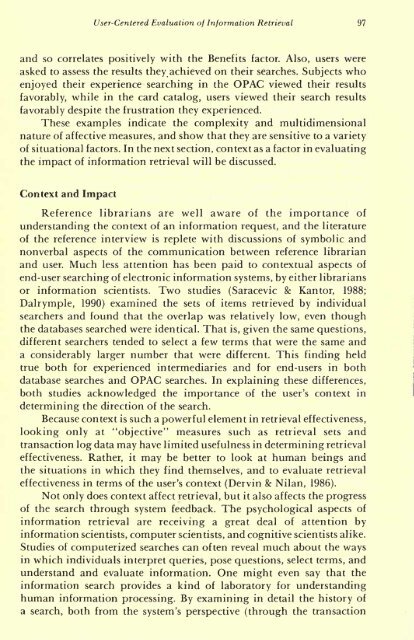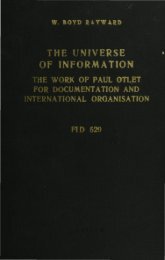User-Centered Evaluation of Information Retrieval - ideals
User-Centered Evaluation of Information Retrieval - ideals
User-Centered Evaluation of Information Retrieval - ideals
You also want an ePaper? Increase the reach of your titles
YUMPU automatically turns print PDFs into web optimized ePapers that Google loves.
<strong>User</strong>-<strong>Centered</strong> <strong>Evaluation</strong> <strong>of</strong> <strong>Information</strong> <strong>Retrieval</strong> 97<br />
and so correlates positively with the Benefits factor.<br />
Also, users were<br />
asked to assess the results they achieved on their searches. Subjects who<br />
enjoyed their experience searching in<br />
the OPAC viewed their results<br />
favorably, while in the card catalog, users viewed their search results<br />
favorably despite the frustration they experienced.<br />
These examples indicate the complexity and multidimensional<br />
nature <strong>of</strong> affective measures, and show that they are sensitive to a variety<br />
<strong>of</strong> situational factors. In the next section, context as a factor in evaluating<br />
the impact <strong>of</strong> information retrieval will be discussed.<br />
Context and Impact<br />
Reference librarians are well aware <strong>of</strong> the importance <strong>of</strong><br />
understanding the context <strong>of</strong> an information request, and the literature<br />
<strong>of</strong> the reference interview is replete with discussions <strong>of</strong> symbolic and<br />
nonverbal aspects <strong>of</strong> the communication between reference librarian<br />
and user. Much less attention has been paid to contextual aspects <strong>of</strong><br />
end-user searching <strong>of</strong> electronic information systems, by either librarians<br />
or information scientists. Two studies (Saracevic & Kantor, 1988;<br />
Dalrymple, 1990) examined the sets <strong>of</strong> items retrieved by individual<br />
searchers and found that the overlap was relatively low, even though<br />
the databases searched were identical. That is, given the same questions,<br />
different searchers tended to select a few terms that were the same and<br />
a considerably larger number that were different. This finding held<br />
true both for experienced intermediaries and for end-users in both<br />
database searches and OPAC searches. In explaining these differences,<br />
both studies acknowledged the importance <strong>of</strong> the user's context in<br />
determining the direction <strong>of</strong> the search.<br />
Because context is such a powerful element in retrieval effectiveness,<br />
looking only at "objective" measures such as retrieval sets and<br />
transaction log data may have limited usefulness in determining retrieval<br />
effectiveness. Rather, it may be better to look at human beings and<br />
the situations in which they find themselves, and to evaluate retrieval<br />
effectiveness in terms <strong>of</strong> the user's context (Dervin & Nilan, 1986).<br />
Not only does context affect retrieval, but it also affects the progress<br />
<strong>of</strong> the search through system feedback. The psychological aspects <strong>of</strong><br />
information retrieval are receiving a great deal <strong>of</strong> attention by<br />
information scientists, computer scientists, and cognitive scientists alike.<br />
Studies <strong>of</strong> computerized searches can <strong>of</strong>ten reveal much about the ways<br />
in which individuals interpret queries, pose questions, select terms, and<br />
understand and evaluate information. One might even say that the<br />
information search provides a kind <strong>of</strong> laboratory for understanding<br />
human information processing. By examining in detail the history <strong>of</strong><br />
a search, both from the system's perspective (through the transaction
















